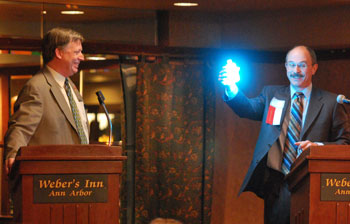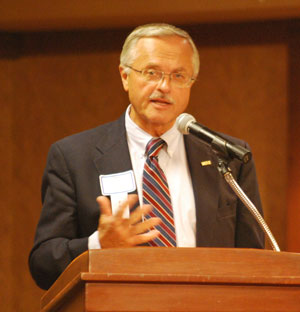Chamber Breakfast Glows Blue

Ed Pagani of Lumigen Inc. holds aloft a chemiluminescent compound that Russ Collins may or may not have been tempted to drink.
Ed Pagani could have gotten an award for best prop, if such an award were given at Morning Edition. Pagani, a former Pfizer executive who’s now general manager of Lumigen Inc. and chair of the Ann Arbor Area Chamber of Commerce board, was one of five speakers at Wednesday’s breakfast meeting, which drew about 200 people. The Chronicle didn’t hear a single one of them make a “Glow Blue” joke – even though his elixir did evoke the University of Michigan’s decommissioned nuclear reactor.
As is the drill at these monthly meetings, each speaker got five minutes to talk about their project or business. Wednesday’s topics ranged from the auto industry and Zipcars to downtown development and a local reentry program for former prisoners. Russ Collins, executive director of the Michigan Theater, was emcee. Here’s a brief recap:
David Cole, chairman of the Center for Automotive Research: Saying that people in Ann Arbor tend to be ignorant of the auto industry, Cole defended the domestic automakers. All auto manufacturers globally are struggling, he said, and the worldwide financial crisis has exacerbated their challenges, causing sales to fall to Depression-era levels.
Cole doubts we’ll see any of the domestics declare bankruptcy, since the cost of such a failure would be higher than the bridge loans provided by the federal government. A bankruptcy could push auto suppliers over a cliff, cascading job losses to a conservative estimate of 2.5 to 3 million, and perhaps as high as 5 million, he said.
The good news is that “times are not going to be bad forever,” Cole said. Labor costs are coming closer to parity between domestic and international automakers, and the problem of overcapacity – creating higher supply than demand – is being addressed. Eventually, pent-up demand will lead to profitability, he said. “The real issue is living to the future.”
Mary King, community coordinator for the Michigan Prisoner ReEntry Initiative of Washtenaw County: King described how this program aims to reduce the 76% recidivism rate for people released from prison who return to Washtenaw County. The ultimate aim, she said, is to reduce crime, but it’s also an economic issue – the state spends about $2 billion annually through the Department of Corrections. Locally, about 300 people are released each year, and the program begins by meeting with them 60 days before they’re released. MPRI does a needs assessment, finding out if they need housing (about 30% do), a job, training, transportation or other support. From that assessment, the program develops a plan for services that are provided for the critical 90 days after their release. (Additional, less intensive support is provided for 90 days after that.)
One of the events held for each person is a welcome home lunch with local law enforcement officials. That statement drew laughs from the audience, which prompted King to say, “You should see their faces when we tell them in prison that’s going to happen.”
King said one of the best ways to help is to offer jobs to MPRI’s clients, or to act as a job coach, and she urged businesses to consider doing that.
Ed Pagani, general manager of Lumigen Inc.: Though Lumigen is based in Southfield and owned by the much larger firm Beckman Coulter, Pagani has strong ties to Ann Arbor. In addition to his work with the chamber, he’s on the executive committee of Ann Arbor Spark and is former chairman of the trade group MichBio, based in Ann Arbor.
But his five minutes on Wednesday focused on giving an overview of Lumigen’s work. The company makes chemiluminescent compounds – “things that light up,” Pagani said, by way of explanation to an audience of mostly (one assumes) non-scientists. These compounds are used in life science research and testing for a wide range of medical issues, including fertility, diabetes, anemia, cardiovascular diseases and more. Lumigen has 40 employees and about $50 million in revenues, he said.
Nancy Shore, getDowntown program director: Following yesterday’s unveiling of four new Zipcars in downtown Ann Arbor, Shore gave an overview of the program and urged people to join. She said the car-share program eliminates some of the excuses she hears from downtown workers, who say they’d like to take a bike or bus to work, but that they sometimes need a car during the day. She highlighted some of the local businesses involved in the project, including the Betty Brigade, which has a contract to do regular cleaning of the fleet. “It is a sweet deal,” Shore said of the Zipcar program, “and it’s very affordable.”
Sandi Smith, Trillium Real Estate president and Ann Arbor City Council member: Smith mentioned that her real estate firm recently relocated to a building in Kerrytown’s Braun Court, but she spent most of her time talking about issues related to her work on city council and as a Downtown Development Association board member. That experience has caused her to see the city through a different lens, she said. Smith said that she stayed in Ann Arbor after graduating from UM, but young people aren’t as likely to do that these days. They’re looking for downtowns that are vibrant, diverse, with a certain critical mass of humanity, mass transit that works, music and the arts, with nearby recreation and natural resources. “We have the opportunity today to create such a place,” she said.
She urged people in the audience to voice their opinions about proposed zoning changes under the A2D2 initiative. Public comment sessions will be held on Monday, March 23 at 7 p.m. in the city council chambers (2nd floor of city hall, 100 N. Fifth Ave.), with others set for April 20 and May 4. She said she’s discovered during her five months on council that the same 20 or so people show up at all the meetings, and “most of them don’t want Ann Arbor to grow.” Call or email your council representative, Smith said. “We really need to hear what’s important for your businesses not just to survive, but thrive.”





The Russ Collins I know was most assuredly tempted to drink that glowing concoction!
The bad news for Councilmember Smith is that those are the same 20 people that vote in the City Council primaries. They are not anti-growth. They are anti-irresponsible growth. Like building a brand new commercial building in a neighborhood, in a floodway, then realizing there are perfectly fine existing buildings available to be purchased or leased downtown.
I for one thank God for those people who care enough to attend meetings, volunteer for boards and commissions, and most of all, pay attention to what is going on in this town. They have saved us all many times from Council making some very bad choices. Unfortunately, many Councilmembers choose to tune these wise people out and our city has the scars to prove it.
Irresponsible growth is urban sprawl. Responsible growth is increased urban density. Most of these “20″ contributors are fine with density as a concept, but complain about every new project.
The recently proposed projects in my neighborhood are excellent examples of urban sprawl (Moravian and City Place). Developers will always try to exploit less expensive land on the fringe. If you want downtown density, you need to build up the pressure in the core and stop the leaks. If you keep opening the valves and letting out the steam into the surrounding neighborhoods, you will never get the density you are seeking.